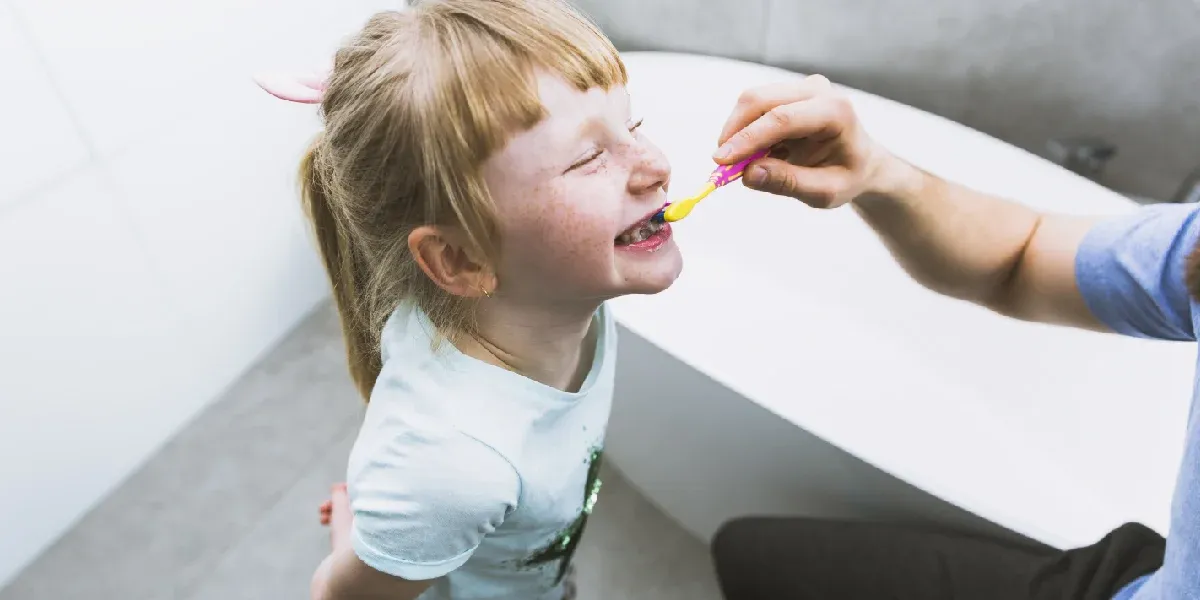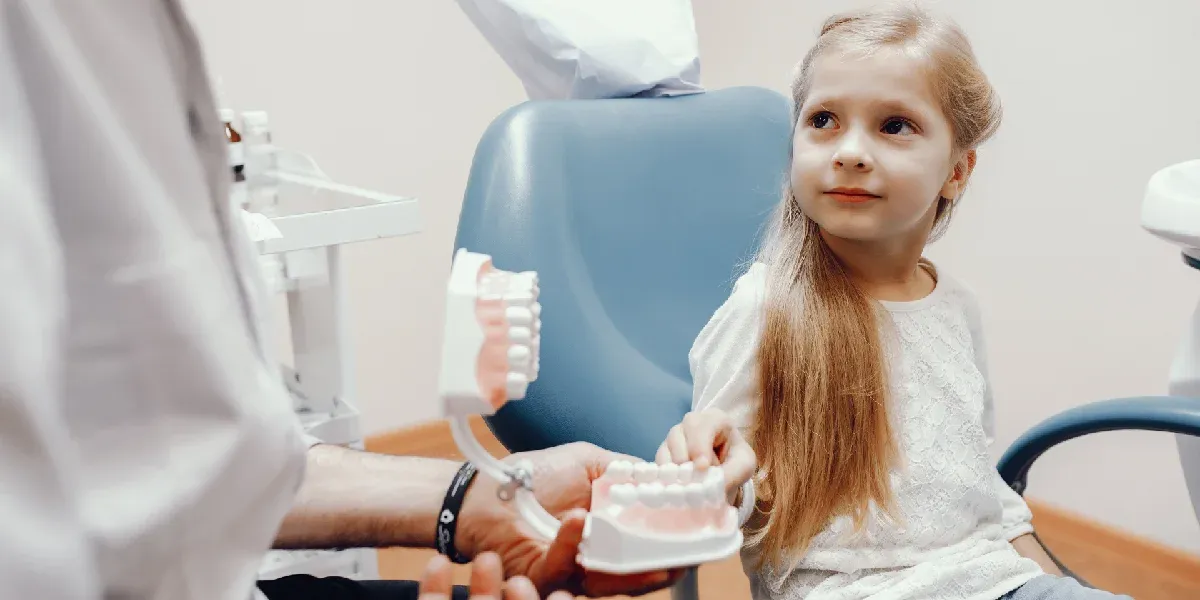
What is a Fluoride Treatment for Kids?
Besides brushing and flossing the teeth, fluoride treatment for kids is also essential. Fluoride treatment is a preventative measure to protect your child's oral health. It decreases the chances of tooth decay or cavities, which are common among children. The minerals found in fluoride slow down the decay process. It can even stop its progression and helps strengthen the tooth enamel.
According to CDC, Fluoride varnish helps prevent around one-third (33%) of tooth decay in newborn teeth. Children in communities with fluoridated tap water had fewer cavities than children in communities without fluoridated tap water. Likewise, kids who use fluoride toothpaste regularly will have fewer cavities.
Studies indicate that children who received fluoride treatment had 43% fewer chances of getting cavities or tooth decay. A fluoride treatment is considered safe if the dose is within the prescribed limit. Learn more about fluoride treatment and its benefits for your child's oral health.
What is Fluoride, and Why Is It Important for Teeth?
Fluoride is a vital mineral that helps fight tooth cavities and builds strong teeth. It supports healthy tooth enamel and fights harmful bacteria to teeth and gums. Fluoride is found in oceans, rocks, plants, and groundwater.
Studies indicate that more than 50% of children aged six to eight have at least one cavity in their baby teeth. It is estimated that more than 51 million hours are lost because of this dental disease which is becoming more prevalent. Fluoride treatment works as an anti-cavity treatment to fight tooth cavities and decay.
Fluoride is generally added to dental products such as toothpaste and community water sources to facilitate kids and adults alike. Statistics reveal that drinking fluoridated water lessens cavities by up to 25%. Moreover, CDC considers community water fluoridation one of the most significant public health achievements of the 21st Century.
Fluoride Treatment: What Is It and Different Types of Treatment?
Fluoride treatment is still an option in communities where fluoridated water is unavailable. Moreover, your child's dentist usually recommends a fluoride varnish treatment for your child if he is more prone to cavities.
Dentists worldwide suggest that children get fluoride treatment when their teeth erupt. Most children should receive fluoride treatment after every three to six months for better oral health maintenance. It's best to consult your child's dentist to know how often they need this treatment.
The sugars and bacteria in your child's mouth led to demineralization and cavity formation. This demineralization, i.e., the loss of minerals, wears down the tooth enamel, which is responsible for fighting harmful bacteria and acids. The loss of minerals needs to be restored to help prevent tooth cavities. Fluoride treatment is one way to remineralize your child's teeth, and it can reverse the decay process if caught in its early stage. Fluoride treatment is a preventative measure that helps maintain strong and healthy teeth.
You can help your child get the amount of fluoride they need in different ways. Some of these are:
- Choosing ADA-approved Toothpaste for Your Child - All toothpaste with an ADA seal of acceptance must contain fluoride. Besides that, it must also contain other ingredients that improve oral health and prevent enamel erosion. Your child's dentist would be the right person to recommend the toothpaste as per your child's age and requirements.

- Letting Your Child Use Over-the-Counter Mouthwash - Fluoride mouthwash helps reduce the demineralization of teeth and the prevalence of cavities. They are generally safe if your child can rinse the mouth effectively. Besides considering fluoride mouthwash, teaching the basics of using it is good. Also, consult a pediatric dentist to know which mouthwash is best to promote your child's oral health.
- Utilizing Fluoridated Tap Water - Usually, all water contains some fluoride, but it should be enough to prevent tooth decay. Fluoride is added to community water and acts as a public health measure to fight cavities. However, you can choose other fluoride treatments if you do not have fluoridated water in your community. Ensure that you tap fluoridated water for your child over bottled water.
- Scheduling a Dentist's Appointment for Your Child - Fluoride treatment at the dentist's office dramatically benefits your child's oral health. It has a higher concentration than many products in the market and is highly effective. It boosts the natural tooth enamel by providing essential minerals and reducing tooth sensitivity. Dentists apply fluoride varnish on your child's teeth with a small brush. The varnish is painted on the top and sides of each tooth to ensure it's painted well. It's a sticky substance that hardens once saliva is produced. Once the varnish is dried, it takes a few minutes before your child can rinse. The varnish treatment is painless; however, you must prepare your child for the dentist's visit to reduce his dental anxiety.
Benefits of Fluoride Treatment
There are numerous benefits of fluoride treatment for both kids and adults. Some of the notable ones are discussed below.
- Restore Minerals: One of the significant advantages of fluoride treatment lies in remineralization. Your child can lose essential minerals due to acidic foods and drinks. As a result, the tooth enamel gets disrupted, and it cannot perform its optimal function. Fluoride treatment helps restore minerals and strengthen the tooth enamel.
- Prevent Cavities: Cavities are prevalent worldwide and one of tooth loss's leading causes. Fluoride helps fight cavities and prevents the progression of decay. Fluoride treatment is highly recommended for those more prone to tooth cavities or decay. Children are fond of eating sugary and acidic items such as candies, sugary drinks, and starchy food. Along with limiting such foods, good oral hygiene and fluoride treatment are essential.
- Preserve Natural Smile: Along with fighting decay and cavities, fluoride protects the teeth from gum disease and discoloration. Gum diseases cause an unpleasant taste in the mouth and lead to inflammation of the gums. In severe cases, it affects so much that the teeth become loose and eventually fall out. Fluoride helps to protect the teeth from gingivitis and periodontal disease and stops their progression. Also, fluoride makes it harder for stains to form and helps preserve your child's natural smile.
- Avert Teeth Sensitivity: The tooth enamel can erode due to acidic foods and bacterial activity. The eroded tooth enamel exposes the dentin layer, and the child feels a higher tooth sensitivity. While your child eats or drinks hot or cold things, he feels too much tooth sensitivity, which impairs his eating behavior. Fluoride treatment averts teeth sensitivity and protects the tooth enamel from being disrupted.
- Reduce Dental Cost: Fluoride treatment costs a modest fee than you would require for any other dental treatment for your child. Fluoride helps to protect the teeth against gum diseases, cavities, sensitivity, plaque, tooth discoloration, and tooth decay. That means it saves you money, especially in the long run. Moreover, it reduces the cost of different dental treatments as your child would have less chance of getting cavities or tooth decay.
Are There Any Possible Side Effects of Fluoride?
Fluoride is generally considered safe for your child, provided the amount is given per the experts' recommendation. The Mayo Clinic recommends that fluoride intake for children under three should not exceed 1.5 milligrams (mg). Whereas for adolescents and adults, it is up to 4mg. The daily amounts of different categories are listed below.
0-3 years: 0.1-1.5mg.
4-6 years: 1-2.5mg.
7-10 years: 1.5-2.5mg.
Adolescents and adults: 1.5-4mg.
Overdosed fluoride can cause specific problems, such as nausea, diarrhea, excessive sweating, tiredness, etc. Moreover, too much fluoride content can cause:
- Tiny spots on mature teeth
- Pitting and staining on teeth
- Bone homeostasis problems
Concluding Thoughts
Fluoride treatment is a great way to protect your child's oral health needs and prevent cavities. Fluoride, a natural mineral, helps protect the tooth enamel and fights harmful bacteria. It restores the loss of minerals from acidic foods and drinks. However, too much fluoride can cause certain complications. Therefore, you must consult a pediatric dentist about your child's oral health condition to get the best results.
Contact your Stockton dentist, Dr. Sajjad Rizvi, at Happy Kids Dental to learn more about Fluoride Treatment for Kids.
Resource:
Effects of Fluoride on Oral Health
*This media/content or any other on this website does not prescribe, recommend, or prevent any treatment or procedure. Therefore, we highly recommend that you get the advice of a qualified dentist or other medical practitioners regarding your specific dental condition*
Subscribe To Our Newsletter
Get Updates And Learn From The Best


